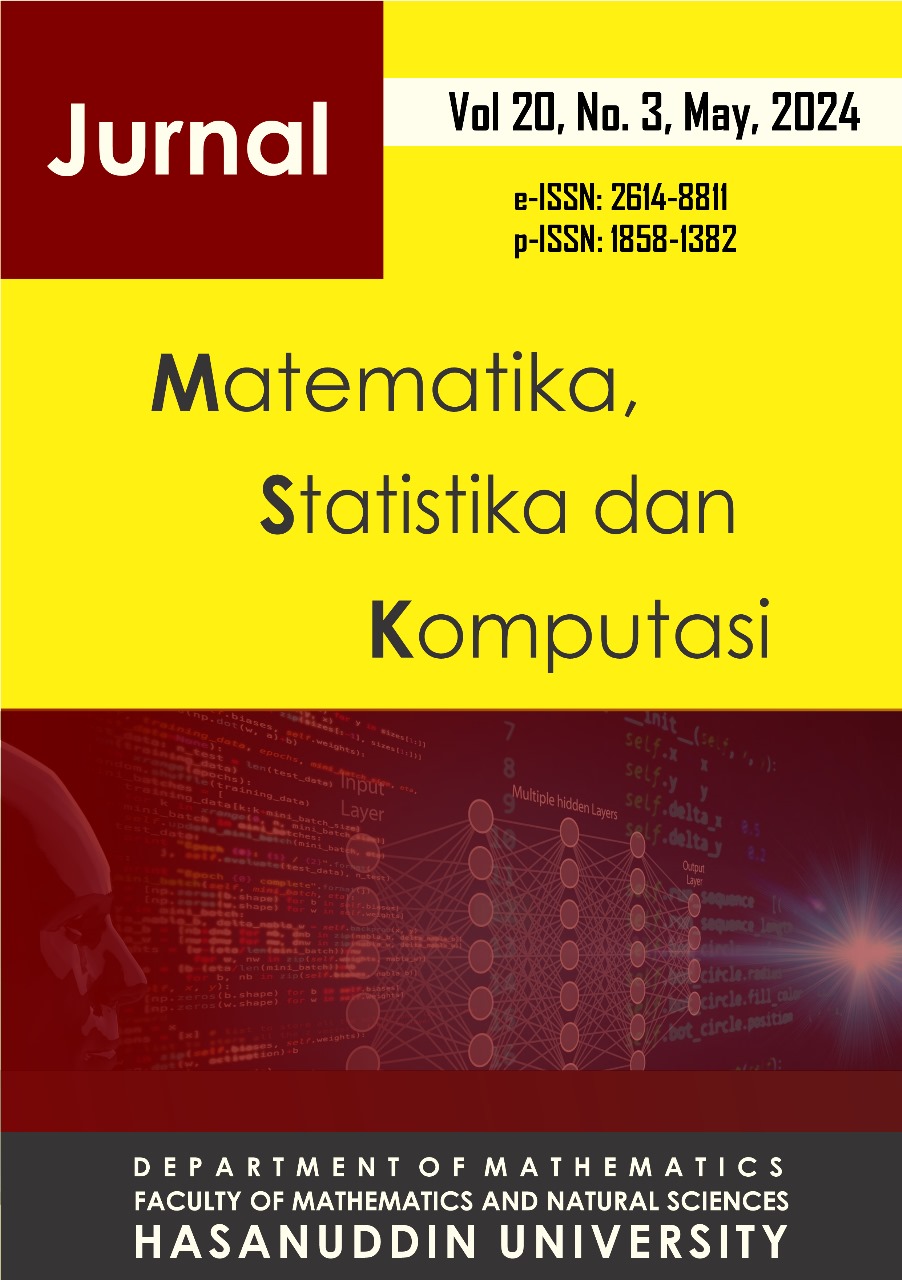Stacking Machine Learning Model for Predict Hotel Booking Cancellations
DOI:
https://doi.org/10.20956/j.v20i3.32619Keywords:
Stacking Model, Base Learner, Meta LearnerAbstract
The hotel prepares rooms and resources according to the room booking. Advance booking from customers is a relationship between customers and hotels that ensures price stability for customers to enjoy services. Cancellation of hotel bookings and inability to satisfy potential customers is a widespread and alarming problem that can increase hotel operating costs and affect customer satisfaction. Given that the impact on the hospitality industry can be very bad, predicting hotel cancellations can be a solution to help build an appropriate operational strategy. Method used in this research is stacking machine learning model. Stacking consists of two levels, where in this study level 0 (base learner) uses the Naive Bayes, Logistic Regression, and Gradient Boosting Machine algorithms while at level 1 (meta learner) uses the Random Forest algorithm. Accuracy value of the stacking model classification and the gradient boosting machine has the highest accuracy value of 0.87. Sensitivity value of the stacking model is 0.86 and is the highest sensitivity value which means that the stacking model classification is very precise in predicting consumers in canceling hotel reservations. Specificity value of the gradient boosting machine is 0.88 and is the highest specificity value, which means that the gradient boosting machine classification is very precise in predicting consumers who do not cancel hotel reservations. Naive bayes and logistic regression classifications have accuracy, sensitivity, specificity, precision values that are not high.
References
. Antonio, N., De Almeida, A. and Nunes, L., 2017. Predicting hotel booking cancellations to decrease uncertainty and increase revenue. Tourism & Management Studies, 13(2), pp.25-39.
. Antonio, N., de Almeida, A. and Nunes, L., 2017, December. Predicting hotel bookings cancellation with a machine learning classification model. In 2017 16th IEEE International Conference on Machine Learning and Applications (ICMLA) (pp. 1049-1054). IEEE.
. Antonio, N., de Almeida, A. and Nunes, L., 2019. Hotel booking demand datasets. Data in brief, 22, pp.41-49.
. Boehmke, B. and Greenwell, B.M., 2019. Hands-on machine learning with R. CRC press.
Buyrukoğlu, S. and Savaş, S., 2023. Stacked-based ensemble machine learning model for positioning footballer. Arabian Journal for Science and Engineering, 48(2), pp.1371-1383.
. Chen, S., Ngai, E.W., Ku, Y., Xu, Z., Gou, X. and Zhang, C., 2023. Prediction of hotel booking cancellations: Integration of machine learning and probability model based on interpretable feature interaction. Decision Support Systems, 170, p.113959.
. Chen, Y., Ding, C., Ye, H. and Zhou, Y., 2022, March. Comparison and analysis of machine learning models to predict hotel booking cancellation. In 2022 7th International Conference on Financial Innovation and Economic Development (ICFIED 2022) (pp. 1363-1370). Atlantis Press.
. Chicco, D. and Jurman, G., 2023. The Matthews correlation coefficient (MCC) should replace the ROC AUC as the standard metric for assessing binary classification. BioData Mining, 16(1), pp.1-23.
. Genuer, R., Poggi, J.M., Genuer, R. and Poggi, J.M., 2020. Random forests (pp. 33-55). Springer International Publishing.
. Li, Y., Tang, S.Y., Johnson, J. and Lubarsky, D.A., 2019. Individualized no‐show predictions: Effect on clinic overbooking and appointment reminders. Production and Operations Management, 28(8), pp.2068-2086.
. Masiero, L., Viglia, G. and Nieto-Garcia, M., 2020. Strategic consumer behavior in online hotel booking. Annals of Tourism Research, 83, p.102947.
. Mohamed, Z. and Shareef, H., 2022. An Adjustable Machine Learning Gradient Boosting-Based Controller for Pv Applications. Available at SSRN 4229749.
. Natekin, A. and Knoll, A., 2013. Gradient boosting machines, a tutorial. Frontiers in neurorobotics, 7, p.21.
. Permai, S.D. and Herdianto, K., 2023. Prediction of Health Insurance Claims Using Logistic Regression and XGBoost Methods. Procedia Computer Science, 227, pp.1012-1019.
. Prasetya, J., 2022. Penerapan Klasifikasi Naive Bayes dengan Algoritma Random Oversampling dan Random Undersampling pada Data Tidak Seimbang Cervical Cancer Risk Factors. Leibniz: Jurnal Matematika, 2(2), pp.11-22.
. Ramasubramanian, K. and Singh, A., 2017. Machine learning using R (No. 1). New Delhi, India: Apress.
. Sánchez-Medina, A.J. and Eleazar, C., 2020. Using machine learning and big data for efficient forecasting of hotel booking cancellations. International Journal of Hospitality Management, 89, p.102546.
. Wang, T., Zhang, K., Thé, J. and Yu, H., 2022. Accurate prediction of band gap of materials using stacking machine learning model. Computational Materials Science, 201, p.110899.
Downloads
Published
How to Cite
Issue
Section
License
Copyright (c) 2024 Author and publisher

This work is licensed under a Creative Commons Attribution 4.0 International License.

This work is licensed under a Creative Commons Attribution 4.0 International License.
Jurnal Matematika, Statistika dan Komputasi is an Open Access journal, all articles are distributed under the terms of the Creative Commons Attribution License, allowing third parties to copy and redistribute the material in any medium or format, transform, and build upon the material, provided the original work is properly cited and states its license. This license allows authors and readers to use all articles, data sets, graphics and appendices in data mining applications, search engines, web sites, blogs and other platforms by providing appropriate reference.







